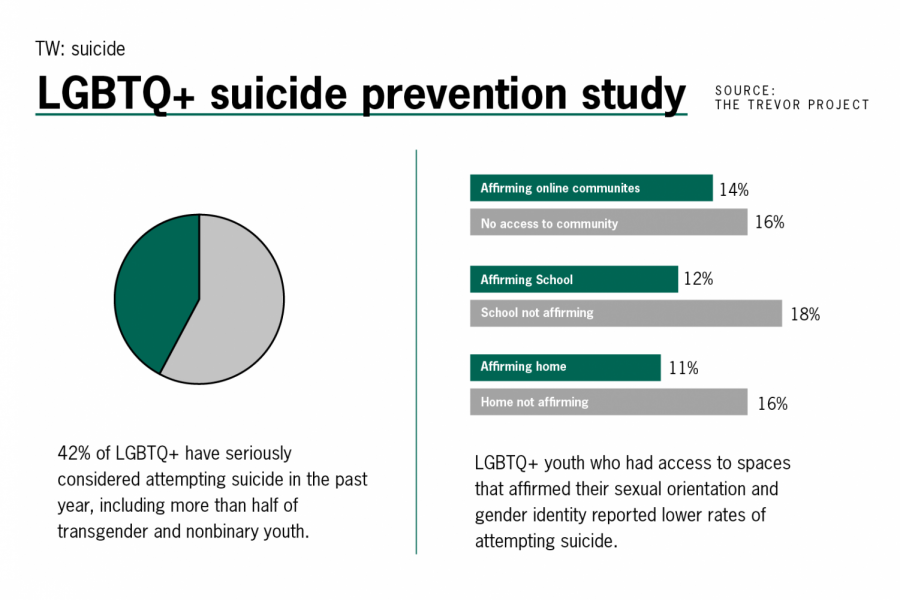UT-Austin conducts study to reduce suicide risk in LGBTQ+ youth
December 14, 2021
Editor’s Note: This article first appeared in the October 11 flipbook.
Trigger Warning: suicide
UT-Austin and UT Southwestern Medical Center researchers are studying intervention methods to determine effective methods in reducing suicide risk for LGBTQ+ youth.
The study, a partnership between researchers from the Steve Hicks School of Social Work, Dell Medical School, UT Southwestern and Texas Health Institute, will launch in January 2022. Phillip Schnarrs, a population health associate professor and co-principal investigator for the study, said the team will work with nearly 600 LGBTQ+ young adults from the Dallas and Austin areas who have thought about suicide.
The team will look at two different interventions. One of the interventions called Suicidal Teens Accessing Treatment After an Emergency Department Visit will link individuals with health or mental care professionals that will follow up with the patients after an emergency room visit. The second program, which is called the Youth-Nominated Support Team, will do the same but also train a support person, like a family member or friend chosen by the patient, he said.
The researchers will receive feedback from patients, family members and the project’s advisory board to see whether the interventions are working and what they can change about them, Schnarrs said.
“What (this study) is doing is it’s trying to move the prevention from after attempt to before attempt,” Schnarrs said. “We want to reach people before they even attempt suicide.”
Schnarrs said LGBTQ+ individuals are more likely to have suicidal thoughts compared to other groups because of their experience living in environments full of discrimination and stigma. According to the Trevor Project, a nonprofit organization focused on suicide prevention efforts among LGBTQ+ individuals, 42% of LGBTQ+ youth across the country seriously considered attempting suicide in the past year.
“LGBTQ individuals are often in environments that are not accepting of them as gender and sexual minorities,” Schnarrs said. “I think that wears on people and especially LGBTQ young people.”
Lauren Gulbas, a social work associate professor and co-investigator of the study, said despite the number of LGBTQ+ individuals who are at risk of suicidal thoughts, they are understudied in the field.
“Currently, most research focuses on straight individuals, yet sexual and gender diverse young adults are at the highest risk of suicidal thoughts and behavior,” Gulbas said.
Gulbas said the team is focusing on matching people with doctors instead of therapists because some patients could be concerned that their therapist is not affirming of their sexuality or gender identity, which makes it difficult to build trust.
Gulbas said she hopes the study will help reduce suicide risk among LGBTQ+ youth.
“I’m a mother, and I’ve worked with adolescents and … individuals who have attempted suicide,” Gulbas said. “And that is really the last thing you want a person close to you to either feel, have thoughts about or to attempt. I can still remember with crystal clarity the story of one particular adolescent that still sticks with me 10 years later.”











